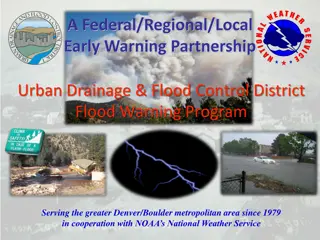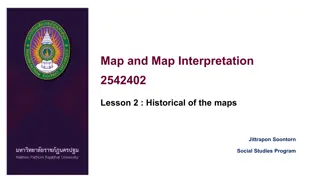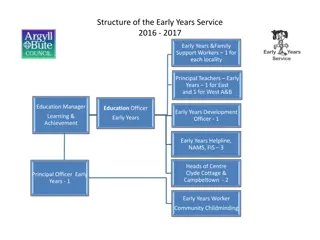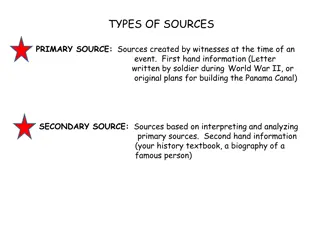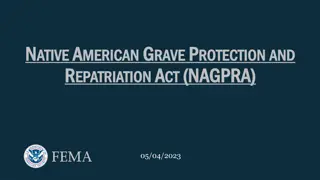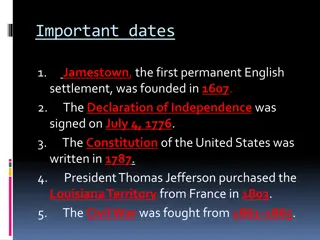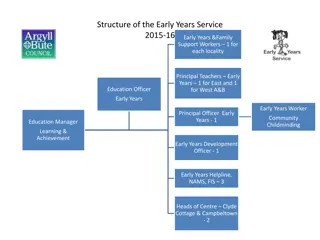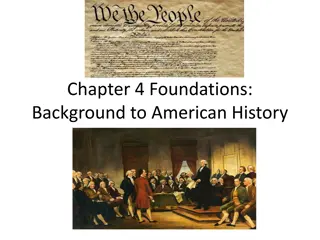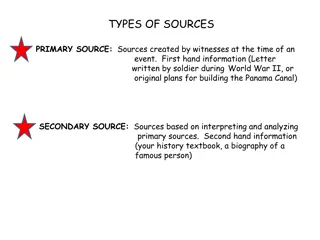Exploring Early American History Through Major Events and Eras
Uncover the pivotal periods in U.S. history up to 1877, detailing key events like colonization, the Revolution, drafting of the Declaration of Independence, and the Civil War. Understand the causes and effects of each era, including religious revivals, westward expansion, reform movements, and Reconstruction. Examine significant dates, reasons for European exploration, and the growth of representative government during the colonial period.
Uploaded on Sep 16, 2024 | 0 Views
Download Presentation

Please find below an Image/Link to download the presentation.
The content on the website is provided AS IS for your information and personal use only. It may not be sold, licensed, or shared on other websites without obtaining consent from the author. Download presentation by click this link. If you encounter any issues during the download, it is possible that the publisher has removed the file from their server.
E N D
Presentation Transcript
identify the major eras and events in U.S. history through 1877, including colonization, revolution, drafting of the Declaration of Independence, creation and ratification of the Constitution, religious revivals such as the Second Great Awakening, early republic, the Age of Jackson, westward expansion, reform movements, sectionalism, Civil War, and Reconstruction, and describe their causes and effects.[8.1A] October 2014 SOCIAL STUDIES EIGHTH GRADE
apply absolute and relative chronology through the sequencing of significant individuals, events, and time periods.[8.1B] October 2014 SOCIAL STUDIES EIGHTH GRADE
explain the significance of the following dates: 1607, founding of Jamestown; 1620, arrival of the Pilgrims and signing of the Mayflower Compact; 1776, adoption of the Declaration of Independence; 1787, writing of the U.S. Constitution; 1803, Louisiana Purchase; and 1861-1865, Civil War.[8.1C] October 2014 SOCIAL STUDIES EIGHTH GRADE
identify reasons for European exploration and colonization of North America.[8.2A] October 2014 SOCIAL STUDIES EIGHTH GRADE
compare political, economic, religious, and social reasons for the establishment of the 13 English colonies.[8.2B] October 2014 SOCIAL STUDIES EIGHTH GRADE
explain the reasons for the growth of representative government and institutions during the colonial period.[8.3A] October 2014 SOCIAL STUDIES EIGHTH GRADE
analyze the importance of the Mayflower Compact, the Fundamental Orders of Connecticut, and the Virginia House of Burgesses to the growth of representative government.[8.3B] October 2014 SOCIAL STUDIES EIGHTH GRADE
describe how religion and virtue contributed to the growth of representative government in the American colonies.[8.3C] October 2014 SOCIAL STUDIES EIGHTH GRADE
analyze causes of the American Revolution, including the Proclamation of 1763, the Intolerable Acts, the Stamp Act, mercantilism, lack of representation in Parliament, and British economic policies following the French and Indian War.[8.4A] October 2014 SOCIAL STUDIES EIGHTH GRADE
explain the roles played by significant individuals during the American Revolution, including Abigail Adams, John Adams, Wentworth Cheswell, Samuel Adams, Mercy Otis Warren, James Armistead, Benjamin Franklin, Bernardo de G lvez, Crispus Attucks, King George III, Haym Salomon, Patrick Henry, Thomas Jefferson, the Marquis de Lafayette, Thomas Paine, and George Washington.[8.4B] October 2014 SOCIAL STUDIES EIGHTH GRADE
explain the issues surrounding important events of the American Revolution, including declaring independence; writing the Articles of Confederation; fighting the battles of Lexington, Concord, Saratoga, and Yorktown; enduring the winter at Valley Forge; and signing the Treaty of Paris of 1783.[8.4C] October 2014 SOCIAL STUDIES EIGHTH GRADE
analyze the issues of the Constitutional Convention of 1787, including the Great Compromise and the Three- Fifths Compromise.[8.4D] October 2014 SOCIAL STUDIES EIGHTH GRADE
analyze the arguments for and against ratification.[8.4E] October 2014 SOCIAL STUDIES EIGHTH GRADE
describe major domestic problems faced by the leaders of the new republic such as maintaining national security, building a military, creating a stable economic system, setting up the court system, and defining the authority of the central government.[8.5A] October 2014 SOCIAL STUDIES EIGHTH GRADE
summarize arguments regarding protective tariffs, taxation, and the banking system.[8.5B] October 2014 SOCIAL STUDIES EIGHTH GRADE
explain the origin and development of American political parties.[8.5C] October 2014 SOCIAL STUDIES EIGHTH GRADE
explain the causes, important events, and effects of the War of 1812.[8.5D] October 2014 SOCIAL STUDIES EIGHTH GRADE
identify the foreign policies of presidents Washington through Monroe and explain the impact of Washington's Farewell Address and the Monroe Doctrine.[8.5E] October 2014 SOCIAL STUDIES EIGHTH GRADE
explain the impact of the election of Andrew Jackson, including expanded suffrage.[8.5F] October 2014 SOCIAL STUDIES EIGHTH GRADE
analyze the reasons for the removal and resettlement of Cherokee Indians during the Jacksonian era, including the Indian Removal Act, Worcester v. Georgia, and the Trail of Tears.[8.5G] October 2014 SOCIAL STUDIES EIGHTH GRADE
explain how the Northwest Ordinance established principles and procedures for orderly expansion of the United States.[8.6A] October 2014 SOCIAL STUDIES EIGHTH GRADE
explain the political, economic, and social roots of Manifest Destiny.[8.6B] October 2014 SOCIAL STUDIES EIGHTH GRADE
analyze the relationship between the concept of Manifest Destiny and the westward growth of the nation.[8.6C] October 2014 SOCIAL STUDIES EIGHTH GRADE
explain the causes and effects of the U.S.-Mexican War and their impact on the United States.[8.6D] October 2014 SOCIAL STUDIES EIGHTH GRADE
identify areas that were acquired to form the United States, including the Louisiana Purchase.[8.6E] October 2014 SOCIAL STUDIES EIGHTH GRADE
analyze the impact of tariff policies on sections of the United States before the Civil War.[8.7A] October 2014 SOCIAL STUDIES EIGHTH GRADE
compare the effects of political, economic, and social factors on slaves and free blacks.[8.7B] October 2014 SOCIAL STUDIES EIGHTH GRADE
analyze the impact of slavery on different sections of the United States.[8.7C] October 2014 SOCIAL STUDIES EIGHTH GRADE
identify the provisions and compare the effects of congressional conflicts and compromises prior to the Civil War, including the roles of John Quincy Adams, John C. Calhoun, Henry Clay, and Daniel Webster.[8.7D] October 2014 SOCIAL STUDIES EIGHTH GRADE
explain the roles played by significant individuals during the Civil War, including Jefferson Davis, Ulysses S. Grant, Robert E. Lee, and Abraham Lincoln, and heroes such as congressional Medal of Honor recipients William Carney and Philip Bazaar.[8.8A] October 2014 SOCIAL STUDIES EIGHTH GRADE
explain the causes of the Civil War, including sectionalism, states' rights, and slavery, and significant events of the Civil War, including the firing on Fort Sumter; the battles of Antietam, Gettysburg, and Vicksburg; the announcement of the Emancipation Proclamation; Lee's surrender at Appomattox Court House. the assassination of Abraham Lincoln.[8.8B] October 2014 SOCIAL STUDIES EIGHTH GRADE
analyze Abraham Lincoln's ideas about liberty, equality, union, and government as contained in his first and second inaugural addresses and the Gettysburg Address and contrast them with the ideas contained in Jefferson Davis's inaugural address.[8.8C] October 2014 SOCIAL STUDIES EIGHTH GRADE
evaluate legislative reform programs of the Radical Reconstruction Congress and reconstructed state governments.[8.9A] October 2014 SOCIAL STUDIES EIGHTH GRADE
evaluate the impact of the election of Hiram Rhodes Revels.[8.9B] October 2014 SOCIAL STUDIES EIGHTH GRADE
explain the economic, political, and social problems during Reconstruction and evaluate their impact on different groups.[8.9C] October 2014 SOCIAL STUDIES EIGHTH GRADE
identify the effects of legislative acts such as the Homestead Act, the Dawes Act, and the Morrill Act.[8.9D] October 2014 SOCIAL STUDIES EIGHTH GRADE
locate places and regions of importance in the United States during the 17th, 18th, and 19th centuries.[8.10A] October 2014 SOCIAL STUDIES EIGHTH GRADE
compare places and regions of the United States in terms of physical and human characteristics.[8.10B] October 2014 SOCIAL STUDIES EIGHTH GRADE
analyze the effects of physical and human geographic factors on major historical and contemporary events in the United States.[8.10C] October 2014 SOCIAL STUDIES EIGHTH GRADE
analyze how physical characteristics of the environment influenced population distribution, settlement patterns, and economic activities in the United States during the 17th, 18th, and 19th centuries.[8.11A] October 2014 SOCIAL STUDIES EIGHTH GRADE
describe the positive and negative consequences of human modification of the physical environment of the United States.[8.11B] October 2014 SOCIAL STUDIES EIGHTH GRADE
describe how different immigrant groups interacted with the environment in the United States during the 17th, 18th, and 19th centuries.[8.11C] October 2014 SOCIAL STUDIES EIGHTH GRADE
identify economic differences among different regions of the United States.[8.12A] October 2014 SOCIAL STUDIES EIGHTH GRADE
explain reasons for the development of the plantation system, the transatlantic slave trade, and the spread of slavery.[8.12B] October 2014 SOCIAL STUDIES EIGHTH GRADE
explain the reasons for the increase in factories and urbanization.[8.12C] October 2014 SOCIAL STUDIES EIGHTH GRADE
analyze the causes and effects of economic differences among different regions of the United States at selected times in U.S. history.[8.12D] October 2014 SOCIAL STUDIES EIGHTH GRADE
analyze the War of 1812 as a cause of economic changes in the nation.[8.13A] October 2014 SOCIAL STUDIES EIGHTH GRADE
identify the economic factors that brought about rapid industrialization and urbanization.[8.13B] October 2014 SOCIAL STUDIES EIGHTH GRADE
explain why a free enterprise system of economics developed in the new nation, including minimal government intrusion, taxation, and property rights.[8.14A] October 2014 SOCIAL STUDIES EIGHTH GRADE
describe the characteristics and the benefits of the U.S. free enterprise system during the 18th and 19th centuries.[8.14B] October 2014 SOCIAL STUDIES EIGHTH GRADE















